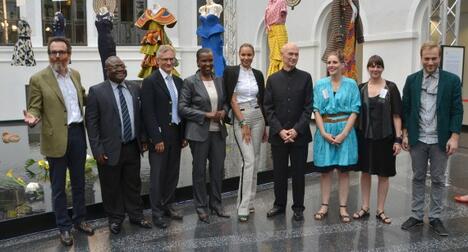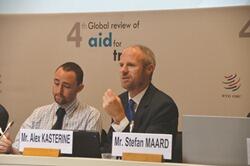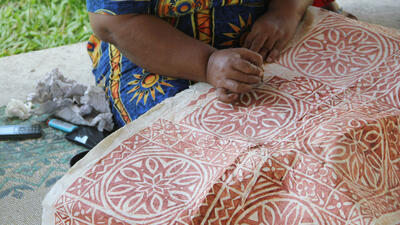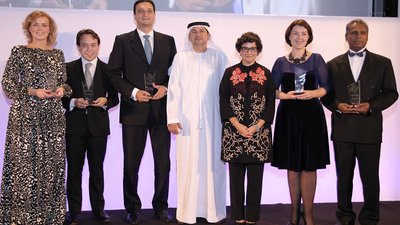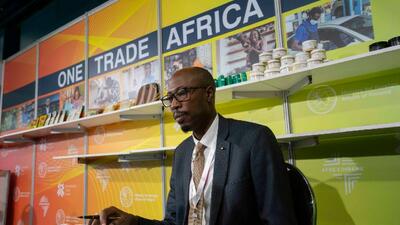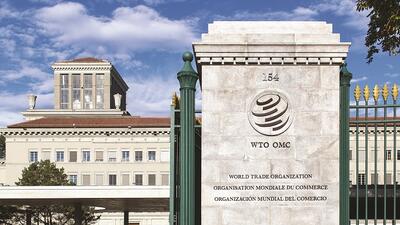Plugging SMEs into global value chains
The International Trade Centre’s (ITC) participation in the Fourth Global Review of Aid for Trade was fully aligned with its mandate to empower small and medium-sized enterprises (SMEs) of developing countries to become competitive exporters in global markets and to ensure that their viewpoints are reflected in the Aid for Trade dialogue.
The Global Review, held from 8 to 10 July at the World Trade Organization’s (WTO) headquarters in Geneva, resulted in ITC's largest participation to date at the biennial event, with contributions made to six sessions, including the hosting of two side events. The theme was ‘Connecting to value chains’. ITC management also held a series of bilateral meetings with ministers and senior representatives from beneficiary and donor countries to discuss ongoing projects and plans for future cooperation.
‘Our collaboration with ITC has been very, very fruitful,’ said Kebba S. Touray, then Minister of Trade, Regional Integration and Employment of the Gambia, now Minister of Finance and Economic Affairs, after a bilateral meeting with Ashish Shah, Franck Bonzemba and Friedrich von Kirchbach, of ITC. ‘[ITC helps] us to be able to generate reliable data for planning purposes. ITC is really helping us quite a lot because the analysis is as important as the implementation.’
The purpose of the biennial Global Review, which started in 2007, is to monitor the progress of Aid for Trade and to strengthen WTO’s evaluation of the initiative. Delegates examined the use of development assistance to improve the trade prospects of developing countries by building up their supply-side capacity and trade-related infrastructure.
Panellists speaking at the ‘Incorporating developing country SMEs into value chains: Implications for Aid for Trade’ side event discussed market-led approaches to facilitating the integration of SMEs into value chains. The prerequisite to their integration, they said, is that exporters gain market knowledge and an understanding of value chains.
Still, it is not enough to simply connect to value chains, because exporters also need a way to move up them, said Joseph Nkole, the national coordinator of the Cotton Association of Zambia, in an interview after the SME side event.
‘We are now at the stage where, through the mentoring and capacity building of our association by ITC, we have a farmer-owned but professionally managed ginning facility where our farmers are ginning their own cotton,’ Nkole told International Trade Forum.
Nkole added that farmers in his association receive pay that is 30% higher than that of other ginners in the country because they produce and process cotton, after which the lint is sold to partners in Asia.
Panellists at the event highlighted major obstacles that SMEs face in getting their products to markets: high transportation costs along with slow customs procedures and roadblocks, which contribute to making their products less competitive in global markets. The good news is that several countries are already taking steps to simplify processes at border posts to reduce time and money spent in transit.
In addition to reduced travel times, policymakers and private-sector stakeholders have to work together to create business-friendly policy environments and strengthen the ability of trade promotion organizations to assist exporters, said Anabel González, Costa Rica’s Minister of Foreign Trade, at the event. Panellists said this could involve the establishment of a public-private platform and the sharing of best practices. Fashion for a good cause
ITC’s Ethical Fashion Initiative hosted the ‘Connecting artisans with global fashion value chains’ side event to explore business models that integrate artisans in marginalized communities into the global fashion industry.
The initiative has already enabled more than 7,000 artisans – nearly all of them women – to produce goods for brands and distributors all over the world, including fashion designers Stella Jean of Italy and Swiss designer-duo Sabine Portenier and Evelyne Roth, all of whom attended the event. Artisans in Burkina Faso, Ghana and Mali manufacture handwoven fabrics, and artisans in Haiti and Kenya create fashion accessories.
The workers benefit from increased income for their families and communities, while buyers are able to source ethically produced goods that meet their quality standards.
Switzerland’s State Secretariat for Economic Affairs (SECO) is one of the main funders of the Ethical Fashion Initiative. Hans-Peter Egler, Head of Trade Promotion at SECO, described the initiative as a ‘modern kind of collaboration’, adding: ‘I think what is important and what we have learned is that we have to improve constantly, innovate constantly, and we still have to be visionary for the next steps.’
ITC participated in four other events at the Global Review, targeting the topics of environmental sustainability and climate change; the development of trade in services; agricultural value chains and food security; and the impact of geographic indications on development and integration into value chains.
Panellists at these sessions focused on finding ways to improve knowledge and understanding of the role of these target areas in the Aid-for-Trade Initiative, ensuring that the needs of businesses and exporters are being met.
Going forward, ITC’s goal is to intensify its efforts and increase its investment in two directions, said then ITC Deputy Executive Director Jean-Marie Paugam in his concluding remarks on the last day of the event. The first, he said, is to combine export promotion and environmental strategies to create sustainable business models; the second is to improve the collection and dissemination of trade-performance and employment data to equip SMEs.
For more information on ITC’s participation at the Global Review, see here




